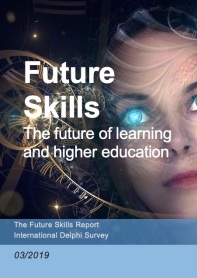
While many studies focus on the changes brought through digital technologies, they relate future skills directly to digital skills, which – as important as they are – only represent one side of the future skill coin. The results of the now released Delphi survey show a broader picture. The approach elaborates on an experts’ informed vision of future higher education (HE), taking into account the demand for future skills, outlines the four signposts of change which will shape the learning revolution in higher education and presents a first model of future skills for future graduates.
 It is part of an overarching research project on “next skills” (www.nextskills.org) and collates opinions from an international experts’ panel of almost 50 experts from higher education and business. Experts were asked both, the degree of relevance, as well as the timeframe of adoption for future skills, future higher education scenarios and the driving pillars of change.
It is part of an overarching research project on “next skills” (www.nextskills.org) and collates opinions from an international experts’ panel of almost 50 experts from higher education and business. Experts were asked both, the degree of relevance, as well as the timeframe of adoption for future skills, future higher education scenarios and the driving pillars of change.
The Delphi survey focused around three questions:
Background: The Delphi study published today marks the last corner stone of the tree-part research project, building on the input of almost 50 international experts from theory and practice. In a first step, 120 German organizations had been identified and analyzed concerning their competency concepts in June 2015. The subsequent expert screening identified about twenty especially advanced conceptions and approaches for competence development and learning architecture. In a second step seventeen advanced „future“ organizations were chosen in order to determine dimensions and structures of future skills from the perspective of these outstanding organizations. The in-depth interview series resulted in more than 11 hours interview material, which was coded, analyzed and participants view reconstructed. The results show that advanced, agile organizations were able to name a set of sixteen future skills. Secondly, changing values within organizations have led to a cultural change within organizations, which goes along with both, a changed understanding of management, and a new form of the organization itself, which is referred to as “next organization”.
Further information
Ulf-Daniel Ehlers – www.ulf.-ehlers.net
Professor Dr. phil. habil. Ulf-Daniel Ehlers
Professor für Bildungsmanagement und Lebenslanges Lernen | Professor for Educational Management and Lifelong Learning
Vizepräsident European Association for Institutions of Higher Education | Vicepresident European Association for Institutions of Higher Education
Vorstandsmitglied des European Distance and E-learning Network | Member of the Executive Committee of the European Distance and E-Learning Network
DHBW Präsidiumsbeauftragter für Digitalisierung von Studium und Lehre | Senior Advisor for Digital Transformation in Teaching and Learning
Duale Hochschule Baden-Württemberg Karlsruhe | Baden-Württemberg Cooperative State University Karlsruhe
mail: ehlers@dhbw-karlsruhe.de
web: www.dhbw-karlsruhe.de | www.ulf-ehlers.net | www.mindful-leaders.net
Twitter | Google+ | XING | LinkedIn

Here’s an article published for #BizTrends2019:
The future of learning in relation to disruptive innovations
https://www.bizcommunity.com/Article/196/726/184859.html